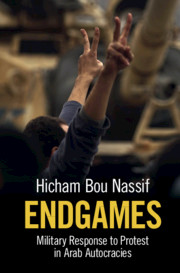
-
Select format
-
- Publisher:
- Cambridge University Press
- Publication date:
- 15 September 2020
- 01 October 2020
- ISBN:
- 9781108893695
- 9781108841245
- 9781108810159
- Dimensions:
- (228 x 152 mm)
- Weight & Pages:
- 0.59kg, 304 Pages
- Dimensions:
- (228 x 152 mm)
- Weight & Pages:
- 0.46kg, 304 Pages
You may already have access via personal or institutional login
Book description
The 2011 Arab Spring is the story of what happens when autocrats prepare their militaries to thwart coups but unexpectedly face massive popular uprisings instead. When demonstrators took to the streets in 2011, some militaries remained loyal to the autocratic regimes, some defected, whilst others splintered. The widespread consequences of this military agency ranged from facilitating transition to democracy, to reconfiguring authoritarianism, or triggering civil war. This study aims to explain the military politics of 2011. Building on interviews with Arab officers, extensive fieldwork and archival research, as well as hundreds of memoirs published by Arab officers, Hicham Bou Nassif shows how divergent combinations of coup-proofing tactics accounted for different patterns of military behaviour in 2011, both in Egypt and Syria, and across Tunisia, and Libya.
Reviews
‘Endgames is a brilliantly informative and compelling comparative study of the troubling role of Arab armies in politics. With profound historical depth spanning more than a century, Bou Nassif skilfully deciphers why and how Arab armies deal with popular dissent and helps both scholars and activists understand officers’ political behavior.’
Zeinab Abul-Magd - Oberlin College
‘Bou Nassif has written what is sure to be one of the defining books on the Arab uprisings of 2011. Synthesizing vast amounts of historical detail, he details how the coup-prevention tactics employed by the region’s autocrats shaped military responses to protests in Tunisia, Egypt, Syria and Libya. If you want to understand what happened in the Arab Spring, this is essential reading.’
Risa Brooks - Marquette University
‘A refreshing take on military reactions to nonviolent mass protest in the Arab world. Drawing on a historical-institutionalist perspective, the empirically rich case studies generate new insights into the complicated interaction between autocratic leaders, military elites and protest movements during episodes of civic resistance. At a moment when democracy is in decline worldwide and elected civilian leaders in the West threaten peaceful protesters with military force, the understanding of military decisions about whether to support or withhold support from political leaders gains a new significance.’
Aurel Croissant - Heidelberg University
Contents
Metrics
Altmetric attention score
Full text views
Full text views help Loading metrics...
Loading metrics...
* Views captured on Cambridge Core between #date#. This data will be updated every 24 hours.
Usage data cannot currently be displayed.
Accessibility standard: Unknown
Why this information is here
This section outlines the accessibility features of this content - including support for screen readers, full keyboard navigation and high-contrast display options. This may not be relevant for you.
Accessibility Information
Accessibility compliance for the PDF of this book is currently unknown and may be updated in the future.


